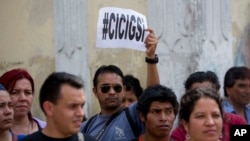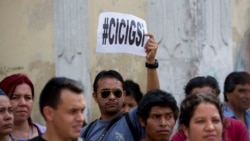The term “impunity” means the failure of the judicial system to bring perpetrators to justice. Impunity shields criminals from punishment, particularly those who are rich and powerful, or those who threaten retribution for punishment. For decades, high levels of impunity have been a major problem in Guatemala. Guatemala’s domestic judicial and political systems have proved largely incapable of curbing violence and containing criminal gangs and organized crime, allowing such criminals to continue operating beyond the reach of law and justice.
That is why, in late 2006, the Government of Guatemala requested international help. As a result, the UN-sponsored International Commission Against Impunity in Guatemala, or CICIG, entered into force the following year.
The commission operates under Guatemalan law. Its mandate is to investigate and prosecute illegal entities and clandestine security organizations operating in Guatemala and help strengthen domestic Guatemalan institutions and the rule of law. With CICIG’s help, Guatemalan prosecutors have investigated 161 government officials, leading to numerous convictions, including the former Head of Criminal Investigation of the National Civil Police, for participating in the extra-judicial killings of 10 prison inmates.
Most notably, CICIG and the public ministry together aided in the extradition of former President Portillo to the United States to face charges of money laundering. Its work also led to criminal charges against the then-current prison director and other prison officials for allowing a convicted murderer to run extortion and other criminal enterprises while in prison. That convicted murderer was Byron Lima, imprisoned for assassinating Bishop Gerardi, a revered figure in Guatemala, who as head of a commission on historical memory, had helped shed light on widespread abuses and violations committed against the indigenous population during Guatemala’s 36-year civil war.
On April 23, Guatemalan President Otto Perez Molina requested the renewal of CICIG’s mandate for another two years.
The United States welcomes President Perez Molina’s decision. CICIG is an important partner of the government and people of Guatemala in the fight against organized crime and impunity.
The United States has contributed more than $25 million in support of CICIG and we are committed to continuing to fund and support CICIG. Through this commission, Guatemala can send an unequivocal message that no one stands above the law.






